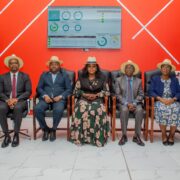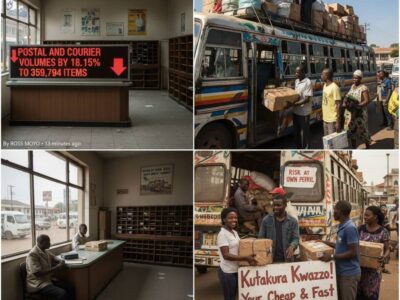By Ross Moyo
The Zimbabwe government has introduced swipe machines at all Tuckshops and informal businesses as a means to stop good reaching directly the informal market and Tuckshops without going via wholesalers.
This was revealed by the MINISTRY OF FINANCE, ECONOMIC DEVELOPMENT AND INVESTMENT PROMOTION in a presser following their meeting as government.
“Point-of-Sale Machines- Micro and Small Enterprises are required to transact through Point-of-Sale Machines and operate a bank account linked to the Zimbabwe Revenue Authority,” the Second Republic deliberated in the meeting.
As part of the new measures to reign in rampant abuse by manufacturers cancelling the middle man opting for informal vendors and Tuckshops, the government has with immediate effect introduced, “Mandatory use of point-of-sale machines by all informal traders.”
This comes at a time when wholesalers are closing which include NRichards, Bon Marche and OK closing across Zimbabwe and it’s a way for the government to increase revenue collection.
Born Marche Borrowdale also closed.
The PRESS STATEMENT stated categorically that,
MEASURES TO ADDRESS THE INFORMALISATION OF THE ECONOMY
Introduction
Since 2021, the Zimbabwe economy has registered strong economic growth, averaging 5.5% annually, anchored by growth in almost all sectors of the economy, Economic slowdown of 2% was, however, recorded in 2024, mainly attributable to the El-Nino induced drought which impacted agriculture production and electricity generation, with secondary effects on the rest of the economy.
Notwithstanding the positive growth trajectory, there is an emerging phenomenon with indications that the economy is informalizing, particularly the retail and the wholesale sectors, with serious ramifications on the overall economy.
Since the beginning of 2023, some manufacturers have been opting to supply their goods directly to the customers and informal retailers, bypassing wholesalers and retailers. This situation has compromised the operations of the formal wholesalers and retailers, as they are competing with informal traders, who are operating outside compliance with regulations such as taxes, licence fees and labour laws, among other formalities.
*Current Measures*
Through the 2024 Mid-Term Budget and Economic Review, and the 2025 National Budget, Government has implemented the following measures in order to improve the level of formalization:
• *Route to Market- to enforce tax compliance by unregistered Micro and Small Enterprises, Government introduced 5% withholding tax to non-registered MSM Es payable to wholesalers and manufacturers.
•VAT Registration Threshold – Government reduced the VAT registration threshold from US$40 000 to US$25 000 to promote formalisation of the informal sectors.
• *Deemed Smuggled Products* — Certain goods such as alcoholic and non¬alcoholic beverages, dairy products, washing powder & detergents and sugar, among others, are now deemed as smuggled unless the seller provides documentary evidence that customs duty was paid for.
• *Taxation of the Emerging sector* — Several emerging sectors were added to the list of companies required to register for tax payment.
• *Point-of-Sale Machines* – Micro and Small Enterprises are required to transact through Point-of-Sale Machines and operate a bank account linked to the Zimbabwe Revenue Authority.
• *Tax Administration* – The Tax Administration system is being automated through the introduction of the Tax and Revenue Management System (TaRMS) and the Fiscalisation Data Management System (FDMS).
• *Targeted Finance Facility* -The Government, through the Reserve Bank of Zimbabwe Launched the Targeted Finance Facility (TEE) to support the productive and retail sectors with working capital requirements.
*Additional Measures*
The measures implemented so far need to be enhanced. Government, in consultation with business and industry, and the Ministry of Industry and Commerce, is therefore proposing additional measures to address the impact of the informalisation of the economy.
Research and consultations indicate that some of the reasons formal businesses are experiencing distress include competition from the informal sector, poor management and poor corporate governance which have resulted in business failure in some instances. The proliferation of smuggled imports-mostly in reserved sectors-which are being sold exclusively in USD, and the high cost of doing business among others, also contribute to the formal sector challenges.
Government is therefore proposing additional measures to promote formalisation and tax compliance by the informal sector, as follows:
*1* .Mandatory use of point-of-sale machines by all informal traders.
*2* .Adoption of international best practise on tax payment, which ensures every eligible taxpayer complies.
*3* .Level the playing field between formal and informal businesses by discouraging manufacturers from supplying directly to end users and the informal market.
*4* .Establishment of a Domestic Interagency Enforcement Team to enforce compliance in the informal sector.
*the licencing and enforcement processes.*
Furthermore;
*6.* The Reserve Bank of Zimbabwe will announce additional measures through the
Monetary Policy Statement to enhance the formalisation of the market.
*7* Government will embark on an exercise to streamline regulatory processes, fees and charges, as well as duplication of work by Government Agencies, in order to reduce the cost of doing business.
*8* .Enforcement of the provisions of the Indigenisation and Economic Empowerment Act which provides for Reserved Sectors.
*9* .Provision of additional incentives to support Industry through the Industrialisation Fund over and above the already existing incentives such as duty-free imports Special Economic Zones incentives.
*10* .Promotion of the procurement of goods and services from local producers and suppliers by Government, to support local industry.
In conclusion, Government is committed to improving the business environment, in order to curb the informalisation of the economy, as we move towards Vision 2030.”
The above statement was a result of yesterday’s meeting where President, Dr. ED Mnangagwa, took his time off his annual leave to chair a session on developments in the economy designed to map the way forward and all Economic Ministries, alongside both Vice Presidents in attendance and deliberated on measures Government has taken on the Economy, and developments in specific economic sectors, including the retail subsector, culminating in additional measures being proposed.















Comments